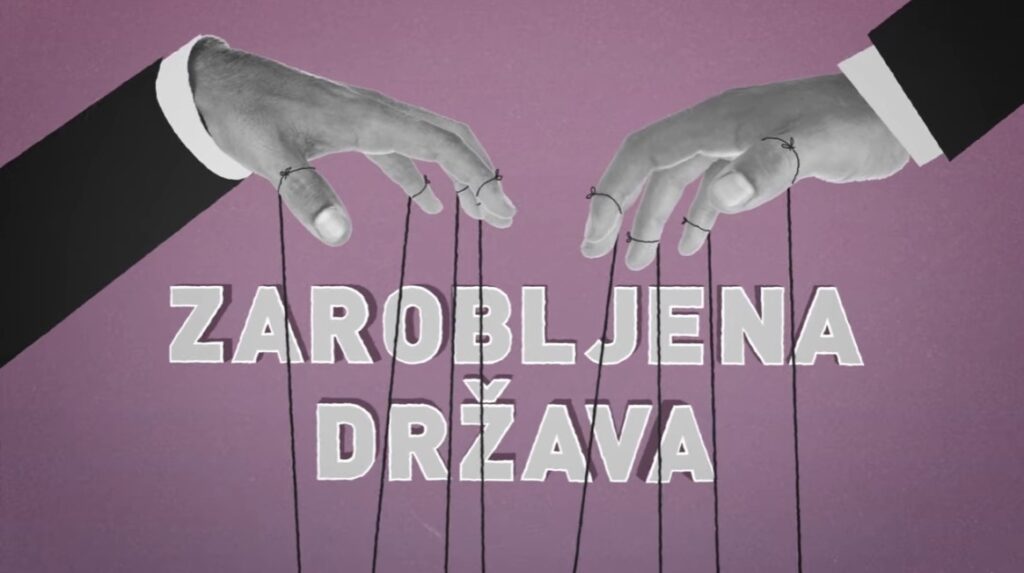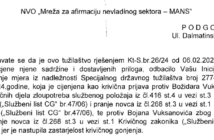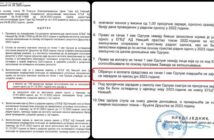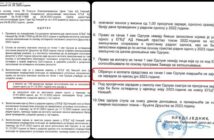The judiciary in Montenegro is perceived as heavily influenced by politics, weakened by a lack of transparency and inefficient in prosecuting corruption cases, all of which result in very poor results.
This is stated in the report of the Network for Affirmation of NGO Sector “State Capture – Montenegro National Report”, which was recently published, and addresses the period from 2013 to 2018, which was especially intense when it comes to the work of the judiciary.
Director of the MANS Investigative Centre, Dejan Milovac, told “Vijesti” that Montenegro’s judiciary and State Prosecutor’s Office “have indisputably played a significant role in state capture of Montenegro, i.e. strengthening of political and interest influence on its institutions, which over time ‘learned’ to subordinate public interest to the private interest, that is, to the party interest.”
“The research MANS conducted showed in what way the complex system that kept the political elite in power functioned in previous years by sparing them almost any criminal liability for their actions, while on the other hand, holders of key positions in the judiciary were rewarded with various privileges “, Milovac emphasized.
Minimum penalties for public officials in corruption cases
The report emphasizes that regular amendments to the law are the primary obstacle in an effective fight against corruption, and specifies that since 2008, the Criminal Code (CC) was amended as many as 12 times.
“The amendments were mostly in favour of perpetrators of corrupt criminal offences, with lasting consequences for judicial outputs in this area… There have been no amendments to the CC that address new forms of crime in the public sector, particularly in areas vulnerable to corruption, such as illicit enrichment of public officials, corruption in public procurement, privatisation and bankruptcy, even though strong evidence in favour of such amendments can be found in international conventions and useful comparative experiences. Despite the numerous amendments, bribery in the public and private sectors has not been treated consistently, and for the same act, one person may be charged with two criminal offences with significantly different penalties”, the document reads.
MANS’ analysis also showed that the number of people convicted for corruption is decreasing, with most of the proceedings relating to the cases of administrative corruption.
“There are no final judgements for numerous criminal offences with elements of corruption committed in commerce. State Prosecutor’s Office failed to win more than half the cases of criminal corruption offences of which the accused were charged”, the document states.
The analysis also states that courts have most frequently pronounced sentences of a prison term of up to one year for criminal offenses involving corruption, and the most serious sentence pronounced was a prison term of five years.
“In 90% of cases, the courts imposed a minimum sentence or a sentence penalty the legal minimum. Public officials were rarely charged and even more rarely convicted. When they were, the courts issued milder
sentences than to those convicted for corruption in commerce,” the document reads.
It is specified that in the observed five-year period, six convictions were issued to five public officials, all of which included minimum sentences or sentences below the legal minimum.
“Those accused of high-level corruption gained the most by signing a plea agreement. No penalty under these agreements was above the legal minimum, regardless of the gravity of the criminal offence, the amount gained or the damages. The courts issued milder penalties for high-level corruption than for administrative corruption, while public officials received more favourable treatment than other accused persons. The courts also appraised the same circumstances differently for different accused persons, in favour of public officials, some of whom were given suspended sentences when there were no legal provisions for this. The fact that bribing a traffic police officer is punished more severely than political corruption shows the extent to which the penalty policy of the courts is distorted”, the report points out.
Aggravating circumstances do not apply to people in public positions
As an example, MANS cites in the document the case of two public officials – former president of the Municipality of Bar, Žarko Pavićević, and his associate, in which the court did not consider as an aggravating circumstance the scale of damage caused by their crimes.
On the other hand, according to the document, a businesswoman from the same municipality who was sentenced to three times the punishment, despite the fact that she caused three times less damage, with the explanation that the damages were an aggravating circumstance.
“High Court in Podgorica sentenced Pavićević to one year in prison for the most severe form of abuse of office. At the time, the prescribed term of imprisonment was between 2 and 10 years. The damages incurred by the Municipality of Bar amounted to nearly two million euros. The offence was also an ongoing crime, for which the CC prescribes more severe sentence of up to 20 years in prison. The same judgement also convicted the Executive Director of the Institute for Construction of Bar, Danijela Krković, for the criminal offense of aiding and abetting the abuse of office, imposing a sentence of six months to five years. Imprisonment of between three months and five years was imposed for a long-term offence of forgery of official documents, despite the legal possibility of a sentence of up to 10 years. The court pronounced a suspended sentence to Danijela Krković”, MANS states and warns that the same court “sentenced the executive director of a private company from Bar to three years in prison for the most severe form of the criminal offence of abuse of office in business activities, and the offence caused damages of 600,000 euros”.
This is contrary to all cases in which public officials or members of an organized criminal group have been convicted of corruption. This confirms that aggravating circumstances apply only to persons who are not public officials or members of criminal groups, in cases that do not involve high-level corruption in the public sector or organized crime”, the report states.
“Forgetful prosecutor” and withdrawn prosecutions
In the same case, according to MANS, there is a drastic example of the negligence of the Special State Prosecutor, who “aided the accused in the case of high-level corruption and prevented the court from imposing a stricter punishment.”
“Mild sentences were imposed and the aggravating circumstances ignored due to the prosecutor’s mistake, but he did not appeal against the judgement of the court of first instance. In his closing arguments, the State Prosecutor ‘forgot’ the property gain obtained through the criminal offence. This significantly improved the position of the accused, as they were charged with only the basic form of the criminal offence, which covers a gain of up to €3,000 “, the NGO stated.
They also point out that many charges were rejected because the state prosecutor had withdrawn from prosecution or due to the statute of limitations, which indicates the “incompetence and arbitrariness of the State Prosecutor’s Office in filing indictments, as well as the inefficiency of the judiciary in conducting proceedings”.
“Two thirds of the judgements rejecting charges were adopted due to the prosecutor’s dismissal of charges. This indicates that the State Prosecutor’s Office has no capacity to prove corruption charges in court and that charges are raised without valid evidence, incurring costs to the state budget. Nearly one-third of dismissals occurred due to the statute of limitations, which shows that the judiciary acts untimely and that proceedings are being conducted for an inappropriately long time.
This leads to the rejection of charges and unnecessary costs for the judiciary. After several years of conducting proceedings of corruption cases, state prosecutors have arbitrarily withdrawn charges, without giving any specific reasons. Instead, they issue general statements that the accused did not commit the criminal offences or that there is no evidence”, the document reads.
“Budva” affair and plea agreements
According to the MANS’ analysis, plea agreements have further reduced the penalties for those convicted of high-level corruption, even in cases involving multimillion-euro damages.
“Through plea agreements, the negotiation of punishments below the legal minimum for severe criminal offences of corruption has become the rule, not the exception. The courts simply confirm the extremely mild sentences that the State Prosecutor’s Office agrees with the accused, without analysing whether this is in accordance with the law. Available statistical data shows that the courts imposed penalties at or below the statutory minimum to all state officials convicted of corruption,” the report states.
It is pointed out that it is only in the case of Svetozar Marović did the accused receive a minimum sentence, while in all other proceedings, the sentences were below the minimum.
It is also specified that the conclusion of plea agreements has not helped improve the results in financial investigations, which remain extremely modest, while the State Prosecutor’s Office still has not managed to confiscate property from those convicted for corruption who confessed to criminal offences and then left the country to avoid prison terms and confiscation of property.
“This has further reduced public trust in the judiciary”, MANS concludes.
This is illustrated by the “Budva” affair, in which several public officials were convicted, mainly due to the signing of a plea agreement.
”Almost a third of all criminal judgements involving elements of corruption in a five-year period relate to the Budva affair. Criminal investigations against Svetozar Marović, former President of the Parliament of Montenegro, and members of his criminal group were launched on August 13, 2015.Two days later, implementation of the Criminal Procedure Code began, enabling plea agreements with the accused for the most severe corruption crimes. The initial results in the affair were very modest, and after the arrests of Svetozar Marović and his son Miloš, negotiation of plea agreements started. A total of 21 defendants were convicted for 32 criminal offences, with only two acquittals, of one criminal offence each. In the end, 12 of the accused concluded plea agreements, while some were also convicted in earlier court proceedings. However, in these agreements, the State Prosecutor’s Office agreed exceptionally lenient sentences, which were confirmed by the courts. These were below the legally prescribed minimum, despite the large scale of damages caused or benefits gained, which were determined by the verdicts”, MANS states.
They point out that the final verdicts given on the basis of plea agreements lack reasons for such low sentences, and do not correspond to the public functions of the accused, nor those within the criminal group.
“For example, the head of the criminal group received a more lenient sentence than one of its members. For the most of prominent members of the group, the courts interpreted circumstances as mitigating too benevolently, and in some cases, without basis…”, MANS’ data show.
They remind that after the first convictions, the Marović family started selling property in Montenegro.
“Immediately after launching its financial investigation, the State Prosecutor’s Office concluded an agreement with Miloš Marović, and later on with his father Svetozar. At the proposal of the State Prosecutor’s Office, they were released from detention. The damage caused to the Municipality of Budva in many of these procedures has not been properly estimated, because the lawyer representing the Municipality, who had once been hired by one of the members of the Budva criminal group, did not claim any damages to the municipality. The results of the financial investigation are extremely modest. The property under order of seizure by the State Prosecutor’s Office is no longer registered as owned by the Marović family. The State Prosecutor’s Office carried out concrete measures relating to the Marovićs’ personal property only in July 2017. In the meantime, the family sold the property and fled to Serbia to avoid imprisonment. Thanks to the delay in execution of the prison sentence, which was approved by the Basic court in Kotor upon the motion of the State Prosecutor’s Office, Miloš Marović managed to obtain Serbian citizenship, while Svetozar left Montenegro the day after his release”, the document concludes.
Milovac: If there is no accountability of the judiciary, the changes in the State Prosecutor’s Office are cosmetic
Milovac believes that, regardless of the changes in the State Prosecutor’s Office, which will most likely initially be changes in personnel, after which it remains to be seen whether they will be essential, in order to free state institutions from political influence “we must have a clear system of responsibility in those positions. Montenegro should play a key role in the fight against corruption and organized crime”.
“If we continue with the current practice of judges and prosecutors not being held accountable for overturned verdicts and rejected indictments, for missed chances for criminals and their associates among state officials to be punished on time and adequately, we can only talk about cosmetic changes that will not bring more justice to the citizens of Montenegro”, the director of the MANS Investigative Centre states.
Another key recommendation, he points out, concerns access to information on the work of the State Prosecutors’ Office and courts, which is currently at a level that does not allow for any civilian control of the work of these institutions.
“Without greater transparency in our work, we cannot expect judges and prosecutors to be more accountable, or for the citizens to start restoring trust in these institutions. This is especially important when we talk about the role of the judiciary in the fight against corruption and organized crime, as one of the key tasks of Montenegro’s government on the path towards full membership in the European Union”, Milovac concluded.



